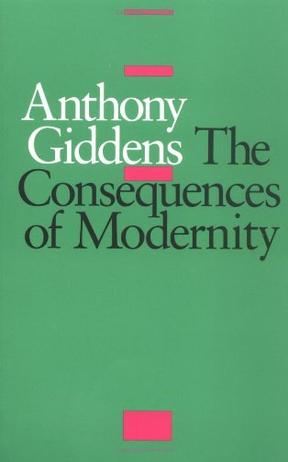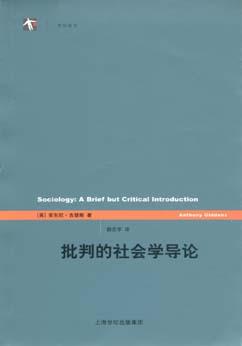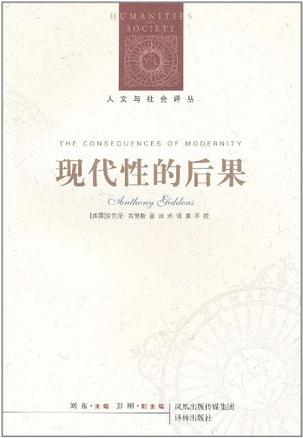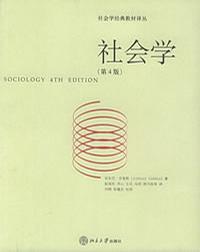-

The Consequences of Modernity
In this major theoretical statement, the author offers a new and provoctive interpretation of institutional transformations associated with modernity. What is modernity? The author suggests, "As a first approximation, let us simply say the following: 'modernity' refers to modes of social life or organization which emerged in Europe from about the seventeenth century onwards and which subsequently became more or less worldwide in their influence." We do not as yet, the author argues, live in a post-modern world. The distinctive characteristics of our major social institutions in the closing years of the twentieth century suggest that, rather than entering into a period of post-modernity, we are moving into a period of "high modernity" in which the consequences of modernity are becoming more radicalized and universalized than before. A post-modern social universe may eventualy come into being, but this as yet lies on the other side of the forms of social and cultural organization that currently dominate world history. In developing a fresh characterization of the nature of modernity, the author concentrates on the themes of "security versus danger and o "trust versus risk. Modernity is a double-edged phenomenon. The development of modern social institutions has created vastly greater opportunities for human beings to enjoy a secure and rewarding existencethan in any type of pre-modern system. But modernity also has a somber side that has become very important in the present century, such as the frequently degrading nature of modern industrial work, the growth of totalitarianism, the threat of environmentsal destruction, and the alrming development of military power and weaponry. The book builds upon the author's pevious theoretical writings and will be of great interest to those who have followed his work through the years. However, this book covers issues the author has not previously analyzed and extends the scope of his work into areas of pressing practical concern. -

批判的社会学导论
该书系英国当代著名社会学家和政治思想家安东尼·吉登斯撰写的一部有关重建社会学理论体系的重要专著。全书着重阐述世界社会学兴起的背景,社会学的使命,探讨和分析世界经典社会学家的现代社会思想,社会发展的脉络,民族国家的特征、现代城市和家庭特征等重要内容。本书不仅在作者的思想发展史上具有重要地位,而且对推动20世纪社会学的发展起到重要作用。 序言 致谢 第一章 社会学:议题与问题 社会学产生的背景 社会学:定义及初步考察 社会学的想像力:作为批判的社会学 第二章 对立的解释:工业社会还是资本主义? 工业社会理论 马克思:资本主义与社会主义 第三章 阶级划分与社会转型 19世纪以来的变迁:公司的权力 “阶级冲突的制度化” 新阶级、新技术 工人阶级的终结? 第四章 现代国家 国家与阶级:晚近的观点 国家与官僚制 批判性评价 国家、社会运动、革命 第五章 城市:都市与日常生活 前资本主义时期的城市与现代城市 “芝加哥学派”的观点 都市与资本主义 都市与日常生活 第六章 家庭与性别 家庭结构的变迁 性别、父权制与资本主义的发展 家庭、婚姻与性别 家庭生活与新社会模式 第七章 资本主义与世界体系 现代化理论及其批判 当代世界的不平等 民族国家、民族主义与军事力量 结论:作为批判理论的社会学 索引 -

The Constitution of Society
Anthony Giddens has been in the forefront of developments in social theory for the past decade. In "The Constitution of Society" he outlines the distinctive position he has evolved during that period and offers a full statement of a major new perspective in social thought, a synthesis and elaboration of ideas touched on in previous works but described here for the first time in an integrated and comprehensive form. A particular feature is Giddens' concern to connect abstract problems of theory to an interpretation of the nature of empirical method in the social sciences. In presenting his own ideas, Giddens mounts a critical attack on some of the more orthodox sociological views. "The Constitution of Society" is an invaluable reference book for all those concerned with the basic issues in contemporary social theory. -

现代性的后果
《现代性的后果》主要内容简介:在这本重要的理论著作中,作者从一种全新的、富有启发性的角度阐释了与现代性相联系的制度变革。他认为,在世纪终结之时,我们并没有进入后现代性时期,而是进入了“盛期现代性”时期。在这一时期,现代性的后果变得前所未有地激剧和普遍化。由此,他更现实地考察了许多人备加褒扬的现代性的各种严重后果,着重讨论了极权的增长、经济增长机制的崩溃、生态环境的破坏、核冲突与大规模战争等问题,并且探讨了人类在这些问题面前的出路。无论是对于专业学者,还是对于一般读者,《现代性的后果》都具有极高的价值。 -

社会学(第4版)
对于第四版《社会学》内容的修订比本书以往所有版本都更为全面。书中所有的经验数据都经过彻底的修订和更新。像前三个版本一样,作者努力使本书既具有可读性和娱乐性,同时也处于本学科的最前沿。本书大量使用了学术研究的成果和专业期刊作为研究资料的来源,为了使教材尽可能具有时事性,也精选了一些报纸和杂志作为最新的资料来源。本书新增了许多部分。通过把新增内容与那些可靠的、经过检验的部分相结合,尽可能地保持了本书权威级社会学绪论的声誉。 本书的第一版出版于1989年,从几个角度开辟了新领域。第四版的创新性在于它是包括了有关互联网和信息技术的其他变化是如何改变我们生活的透彻研究的第一本教材。对这些问题的关注事实上遍布每一章。巨变时期也带来其新的风险,风险也是本教材探讨的一个持续的主题。 -

少林寺第八銅人
第一屆百萬可米瑞智電視小說百萬首獎作品。 九把刀至今最滿意的代表作。 一場假劫文天祥的奇案,蒙元朝廷大軍血腥鎮壓少林,藏經閣被焚,七十二絕技失傳,少林寺從此墮落,成了官宦子弟的武學夏令營。 一個懷抱英雄夢的鄉下窮小子,酒肉聲色的少林寺中,全身塗滿金漆,被強編入銅人陣,擔任藉藉無名的NO.8把關人,受盡欺壓。 他的一生,難道只是為了認可別人的英雄夢而存在?